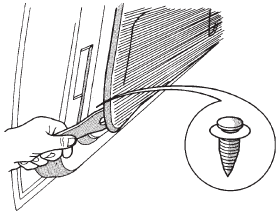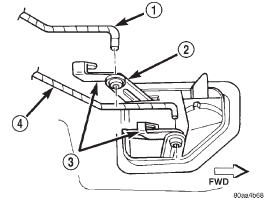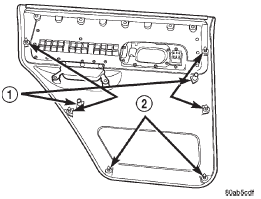Jeep Cherokee (XJ): Rear door waterdam. Rear door. Rear door restraint
REMOVAL (1) Remove door trim panel.
(2) Peel the waterdam from the door.
(3) Route the latch rods and wire harnesses
through the waterdam.
(4) Separate the waterdam from the door inner
panel. INSTALLATION (1) Route the latch rods and wire harnesses
through the waterdam.
1 - INSIDE HANDLE TO LATCH ROD (2) Position the waterdam on the door, apply adhesive
as necessary and press into place.
(3) Install door trim panel. REMOVAL (1) Remove door restraint (check) retaining pin.
(2) For vehicles equipped with power windows and
power door locks, remove trim panel and waterdam.
Disconnect all components and route wire harness
out of door.
1 - LOCATING PINS (3) Remove bolts attaching hinge to door face.
(4) Separate door from vehicle. INSTALLATION (1) Position door in body opening.
(2) Align door hinges, plates and shims and install
bolts. Tighten bolts to 3 N·m (2 ft. lbs.) torque.
(3) Install door restraint (check).
(4) If applicable, route and connect wire harness
connectors.
(5) If necessary, install door waterdam and trim
panel. REMOVAL (1) Remove the door trim panel.
(2) Remove the door restraint (check) retaining pin
from the bracket with a punch.
(3) Remove the nuts and remove the restraint via
the access opening in the door inner panel (Fig. 48). INSTALLATION (1) Position the door restraint in the door by way
of the opening and install the nuts. Tighten the nuts
to 10 N·m (7 ft-lbs) torque.
(2) Position the door restraint in bracket with the
holes aligned and insert the retaining pin.Rear door waterdam

Fig. 45 Detaching Trim Panel Push-In Fasteners
Fig. 46 Latch Rods
2 - INSIDE HANDLE ACTUATOR
3 - CLIP
4 - LOCK TO LATCH RODRear door

Fig. 47 Push-In Fasteners
2 - PUSH-IN FASTENERSRear door restraint
 Front door spacer blocks-twodoor
vehicles. Front door glass. Rear door trim panel
Front door spacer blocks-twodoor
vehicles. Front door glass. Rear door trim panel
 Rear door hinge. Rear door outside handle. Rear door latch
Rear door hinge. Rear door outside handle. Rear door latch
Other materials:
Cooling system fans. Viscous fan drive removal/
installation
Cooling system fans
REMOVAL
Some engines have the mechanical fan/viscous fan
drive assembly mounted directly to the water pump
hub (Fig. 55). It may also be mounted to a hub/bearing
attached to an aluminum bracket on the right
front side of engine (Fig. 56).
(1) Loosen but do not remove at t ...
